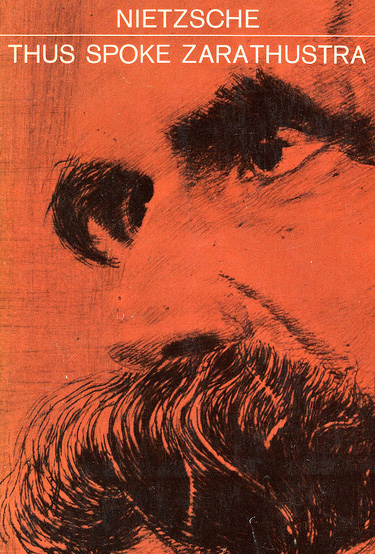8
When Zarathustra had said this to his heart, he hoisted the corpse onto his back and started on his way. And he had not yet gone a hundred paces when someone sneaked up on him and whispered in his ear – and behold! The one who spoke was the jester from the tower.
“Go away from this town, oh Zarathustra,” he said. “Too many here hate you. The good and the just[1] hate you and they call you their enemy and despiser; the believers of the true faith hate you and they call you the danger of the multitude. It was your good fortune that they laughed at you: and really, you spoke like a jester. It was your good fortune that you took up with the dead dog; when you lowered yourself like that, you rescued yourself for today. But go away from this town – or tomorrow I shall leap over you, a living man over a dead one.”
And when he had said this, the man disappeared, but Zarathustra continued his walk through dark lanes.
At the town gate he met the gravediggers. They shone their torches in his face, recognized Zarathustra and sorely ridiculed him. “Zarathustra is lugging away the dead dog: how nice that he’s become a gravedigger! For our hands are too pure for this roast. Would Zarathustra steal this morsel from the devil? So be it then! And good luck with your meal! If only the devil were not a better thief than Zarathustra! – he’ll steal them both, he’ll devour them both!” And they laughed and huddled together.
Zarathustra did not say a word and went on his way. By the time he had walked for two hours past woods and swamps, he had heard too much of the hungry howling of wolves and he grew hungry himself. And so he stopped at a lonely house in which a light was burning.
“Hunger falls upon me like a robber,” said Zarathustra. “In woods and swamps my hunger falls upon me and in the deep night. My hunger has odd moods. Often it comes to me only after a meal, and today it did not come the whole day: just where was it?”
And so Zarathustra pounded on the door to the house. An old man appeared, bearing a light, and he asked: “Who comes to me and to my bad sleep?”
“A living man and a dead one,” replied Zarathustra. “Give me food and drink, I forgot it during the day. Whoever feeds the hungry quickens his own soul – thus speaks wisdom.”[2]
The old man went away but returned promptly and offered Zarathustra bread and wine. “This is a bad region for those who hunger,” he said. “That is why I live here. Beast and human being come to me, the hermit. But bid your companion eat and drink, he is wearier than you.” Zarathustra replied: “My companion is dead, I would have a hard time persuading him.” “That does not concern me,” snapped the old man. “Whoever knocks at my house must also take what I offer him. Eat and take care!” –
Thereupon Zarathustra walked again for two hours, trusting the path and the light of the stars, for he was a practiced night-walker and loved to look in the face of all sleepers.[3] But as dawn greyed Zarathustra found himself in a deep wood and no more path was visible to him. Then he laid the dead man into a hollow tree – for he wanted to protect him from the wolves – and he laid himself down head first at the tree, upon the earth and the moss. And soon he fell asleep, weary in body but with a calm soul.
______________________
The above German-English translation by Adrian del Caro is taken from Thus Spoke Zarathustra (Cambridge University Press, 2006). This Cambridge edition lacks the more detailed notes by Andrés Sánchez-Pascual in Así Habló Zaratustra (Madrid: Alianza Editorial, 2014), translated below.
Notes:
[1] The verbal couple “the good and the just” will be repeated very many times throughout this work. Probably it is an imitation of another verbal couple “hypocrites and Pharisees,” which also appears frequently in the Gospels, and has the same meaning. See, for example, in the third part, “On Old and New Tablets” § 26: “My brothers! In whom does the greatest danger lie for all of future humanity? Is it not in the good and the just? – is it not in those who speak and feel in their hearts: ‘We already know what is good and just, and we have it too’.”
[2] A Psalm quote, 146: 5-7: “Blessed is he who feeds the hungry.”
[3] On this habit of Zarathustra “to look in the face of all sleepers” see also, in this same part, “On the Friend” and in the fourth part, “The Shadow.”

One reply on “Zarathustra’s prologue, 8”
For some unfathomable causes, this sentence from the previous section, Prologue §7, reminded me my identification with the art of the pre-Raphaelites and Maxfield Parrish (cf. my Facebook page). One of the inner realities that differentiates me with white nationalists is that they don’t seem to love this 14-words art (“That the beauty of…”) as much as I do.